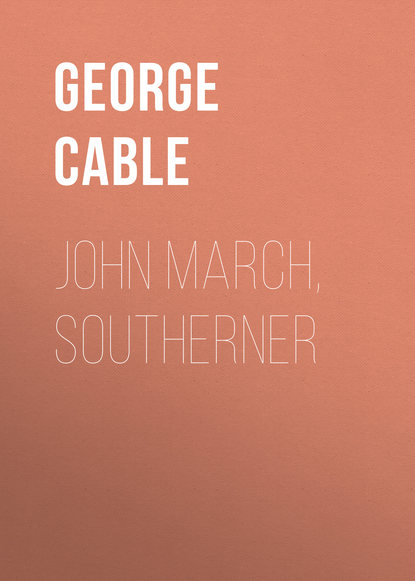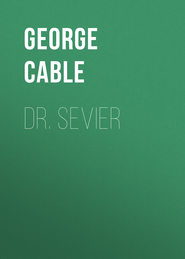По всем вопросам обращайтесь на: info@litportal.ru
(©) 2003-2024.
✖
John March, Southerner
Настройки чтения
Размер шрифта
Высота строк
Поля
"I could 'a' served it in a glass, gentlemen, but we Southe'ne's think it's sweeteh drank fum a gode."
"We met your son at the cotillion," said one, and the father lighted up with such confident expectation of a compliment that the stranger added, cordially, "He's quite noted," though he had not heard of the affair with Leggett.
On the way back Garnet praised everything and everybody. He wished they could have seen Daphne Dalrymple! If it were not for the Northern prejudice against Southern writers, her poems would – "See that fox – ah! he's hid, now."
But the wariest game was less coy than the poetess. She wrote, that day,
"O! hide me from the Northron's eye!
Let me not hear his fawning voice,
I heard the Southland matron sigh
And saw the piteous tear that" …
Thus it ended; "as if," said Garnet to John, who with restrained pride showed him the manuscript, "as if grief for the past choked utterance – for the present. There's a wonderful eloquence in that silence, March, tell her to leave it as it is; dry so."
John would have done this had he not become extremely preoccupied. The affair at the old bridge was everybody's burning secret till the prospectors were gone. But the day after they left it was everybody's blazing news. Oddly enough, not what anybody had done, but what Leggett had said – in contempt of the color line – was the microscopic germ of all the fever. From window to window, and from porch to porch, women fed alarm with rumor and rumor with alarm, while on every sidewalk men collaborated in the invention of plans for defensive vengeance.
"Well, they've caught him – pulled him out of a dry well in Libertyville."
"I beg your pardon, he crossed the Ohio this morning at daylight."
John March was light-headed with much drinking of praise for having made it practicable to "smash this unutterable horror in the egg!"
Ravenel, near the Courier office, stopped at the beckon of Lazarus Graves and Charlie Champion. John was with them, laboring under the impression that they were with him. They wanted to consult Ravenel about the miscreant, and the "steps proper to be taken against him."
"When found," suggested Ravenel, and they pleasantly assented.
"Oh, yes," he said again, as the four presently moved out of the hot sun, "but if the color line hadn't been crossed already there wouldn't be any Leggett."
"But he threatens to cross it from the wrong side," replied John, posing sturdily.
Ravenel's smile broadened. "Most any man, Mr. March, could be enticed across."
The mouth of the enticer opened, but his tongue failed.
"A coat of tah and feathers will show him he mustn't even be enticed across," rejoined Lazarus.
Ravenel said something humorous about the new Dixie and a peace policy, and John's face began to show misgivings; but Captain Champion explained that the affair would be strictly select – best citizens – no liquor – no brawl – no life-taking, unless violent resistance compelled it; in fact, no individual act; but —
"Yes, I know," said Ravenel, "you mean one of those irresistable eruptions of a whole people's righteous indignation, that sweeps before it the whining hyper-criticisms of effeminated civilizations," and the smile went round.
"Gentlemen, there's an easier way to get rid of Cornelius; one, Captain, that won't hurt more by the recoil than by the discharge."
They were all silent. John folded his arms. Presently Graves said, meditatively,
"We don't care to hang him, just at – "
"This juncture," said Ravenel; "no, better give him ten years in the penitentiary – for bigamy."
Sunshine broke on Mr. Graves's face, and he murmured, "Go 'way!"
Champion, too, was radiant. "Hu-u-ush!" he said, "who'll get us the evidence?"
"Old Uncle Leviticus."
The more questions they asked the more pleased with the plan were John's two companions. "Why didn't you think of that?" asked each of the other in mock contempt. The youth felt his growing insignificance reach completeness as Ravenel said,
"In that case you'll not need Mr. March any longer."
"No, of course not," said John, quickly. "I was" – he forced a cough.
The other two waved good-by, and he turned to go with them, but was stopped.
"Don't you want to see me about something else, Mr. March?" said Ravenel, to detain him.
"No, sir," replied John, innocently. "Oh, no, I was – "
There came between them, homeward bound, an open parasol, a mist of muslin as sweet as a blossoming tree, a bow to Mr. Ravenel, and then a kinder one to John.
"Go," said Ravenel, softly. "Didn't you see? She wants you."
John overtook the dainty figure, lifted his military cap, and slackened his pace.
"Miss Fannie?" he caught step with her.
"Oh! – why good morning." She was delightfully cordial.
"Did you want to see me?" he asked. "Mr. Ravenel thought you did."
Fannie raised her brows and laughed.
"Why, really, Mr. Ravenel oughtn't to carry his thinking to such an excess. Still, I'm not sorry for the mistake – unless you are." She glanced at him archly. "Come on," she softly added, "I do want to see you."
XX.
FANNIE SUGGESTS
"Don't look so gruesome." She laughed.
John walked stiffly, frowned, and tried to twist the down on his upper lip. When only fenced and gardened dwellings were about them she spoke again.
"John, I'm unhappy."
"You, Miss Fannie?"
"Yes. As I passed you, you were standing right where you fell five years ago. For three days I've been thinking how deep in debt to you I've been ever since, and – how I've disappointed you."
The youth made no answer. He felt as if he would give ten years of his life to kneel at her feet with his face in her hands and whisper, "Pay me a little love." She laid her arm on her cottage gate, turned her face away, and added,






